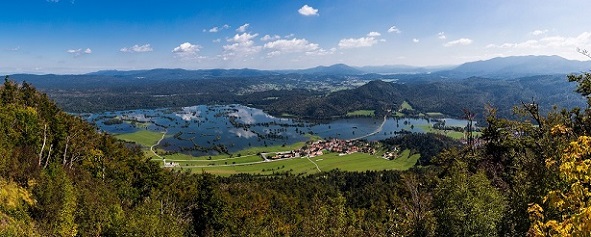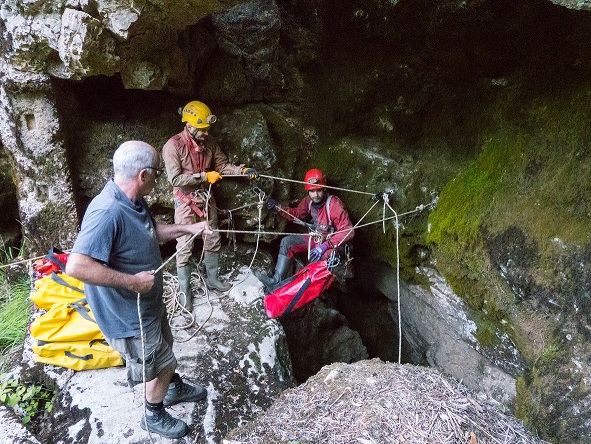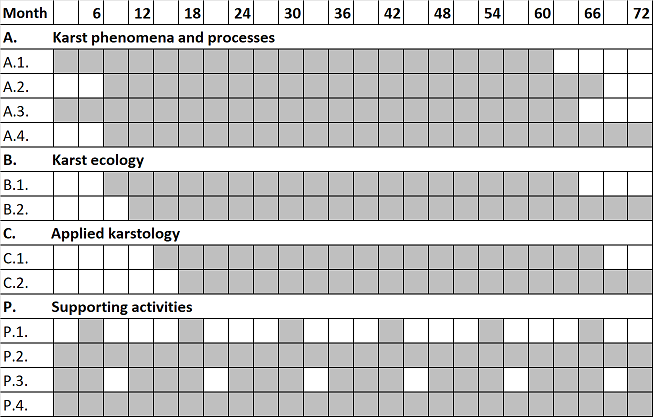Karst Research
Principal Investigator at ZRC SAZU
Nataša Ravbar, PhD-
Original Title
Raziskovanje krasa
Project Team
Magdalena Aljančič, PhD, Matej Blatnik, PhD, Franci Gabrovšek, PhD, Martin Knez, PhD, Peter Kozel, PhD, Cyril Mayaud, PhD, Janez Mulec, PhD, Uroš Novak, Bojan Otoničar, PhD, Metka Petrič, PhD, Tanja Pipan, PhD, Mitja Prelovšek, PhD, Tadej Slabe, PhD, Stanka Šebela, PhD, Astrid Švara, Nadja Zupan Hajna, PhD, Sonja Stamenković-
ARIS Project ID
P6-0119 (B)
-
Duration
1 January 2022–31 December 2027 -
Link to SICRIS
19023 -
Lead Partner
Research Centre of the Slovenian Academy of Sciences and Arts
-
Programme Leader
-
Financial Source
Slovenian Research And Innovation Agency

The Karst Research programme is being implemented by members of the Karst Research Institute, which boasts over 75 years of tradition in developing karstology, a location in the centre of the Classical Karst, and the seat of the International Union of Speleology. It is organized in the form of the “knowledge triangle”, comprising research, innovation and education. It is founded on comprehensive development of karstology as a special branch of science, in which approaches of different disciplines are intertwined.
We are conducting basic interdisciplinary research of karst features and processes, and ecological studies of karst; we are developing regional karstology and striving for the protection of natural heritage. By implementing international or national projects in parallel, we are achieving excellent scientific results regarding the karstification processes on the surface and in caves. We are studying the evolution of the karst landscape and by studying cave sediments, epigenic, hypogenic, hydrothermal caves, and by monitoring active tectonic structures, we are deepening our knowledge of geological, geomorphological and palaeoclimatic evolution of select areas. By monitoring natural and artificial tracers and numerical modelling, we are researching the dynamics of the water flow and the mass transport through karst aquifers. We are examining the selective factors leading to various morphological adaptations of organisms by conducting ecological research of subterranean habitats. We are examining the condition of the environment and the human impact by monitoring the cave climate and the vitality of the populations. We are also conducting applied studies that stem from our knowledge and understanding of karst in order to enable prudent planning of life on karst, the use of natural resources, and sustainable development. Our development of innovative solutions is often internationally transferable.
The programme members are involved with different higher education institutions and are implementing the doctoral study programme, accredited as the UNESCO Chair on Karst Education. For nearly 30 years, we have been organizing the International Karstological School, the main annual meeting of karstologists.
The programme is the foundation for the infrastructural, documentary and publishing activities of the Institute. For nearly 70 years, we have been issuing the central karstological journal Acta Carsologica, listed in SCI, and the book series Carsologica. Under the auspices of the SASA Library, we operate a specialized Library with globally and regionally important karstological literature, and a superbly equipped Karstological laboratory, where we conduct geological, biological, microbiological and chemical investigations using state-of-the-art research equipment. In cooperation with the Speleological Association of Slovenia, we maintain the Cave Registry with data on about 15,000 caves. The Institute is the national coordinator of the European research infrastructures eLTER ESFRI, LifeWatch ERIC, and EPOS ERIC. Our work is highly international; we are supporting the development of karstology in many countries and are connecting karstologists from all over the world.

Planinsko polje, photo Matej Blatnik.

Transport of diving equipment in the cave Matijeva jama, photo Blaž Kogovšek.
A. Karst phenomena and processes
A.1. Researching the formation of the karst surface and caves;
A.2. Studying the evolution of karst areas under various geological, hydrological and climate settings;
A.3. The dynamics, composition and properties of the atmosphere in the karst vadose zone;
A.4. Karst aquifers: hydrodynamics, mass transport, and impacts of environmental changes.
B. Karst ecology
B.1. Evolutionary, ecological and biogeographical assessment of subterranean habitats and organisms;
B.2. Role of microbiota in the natural processes and interactions in karst.
C. Applied karstology
C.1. Organizing and transferring knowledge to practice for planning life on karst;
C.2. Protection of karst features, water resources, biodiversity and subterranean habitats.
S. Supporting activities
S.1. Annual organization of the International Karstological School;
S.2. Regular publication of the journal Acta Carsologica and the book series Carsologica;
S.3. Development of our own study programmes and the implementation of pedagogical activities;
S.4. Management and maintenance of the research infrastructure and database.

Researching the formation of the karst surface and caves
Studying the evolution of karst areas under various geological, hydrological and climate settings
The dynamics, composition and properties of the atmosphere in the karst vadose zone
Karst aquifers: hydrodynamics, mass transport, and impacts of environmental changes
Evolutionary, ecological and biogeographical assessment of subterranean habitats and organisms
Role of microbiota in the natural processes and interactions in karst
Organizing and transferring knowledge to practice for planning life on karst
Protection of karst features, water resources, biodiversity and subterranean habitats